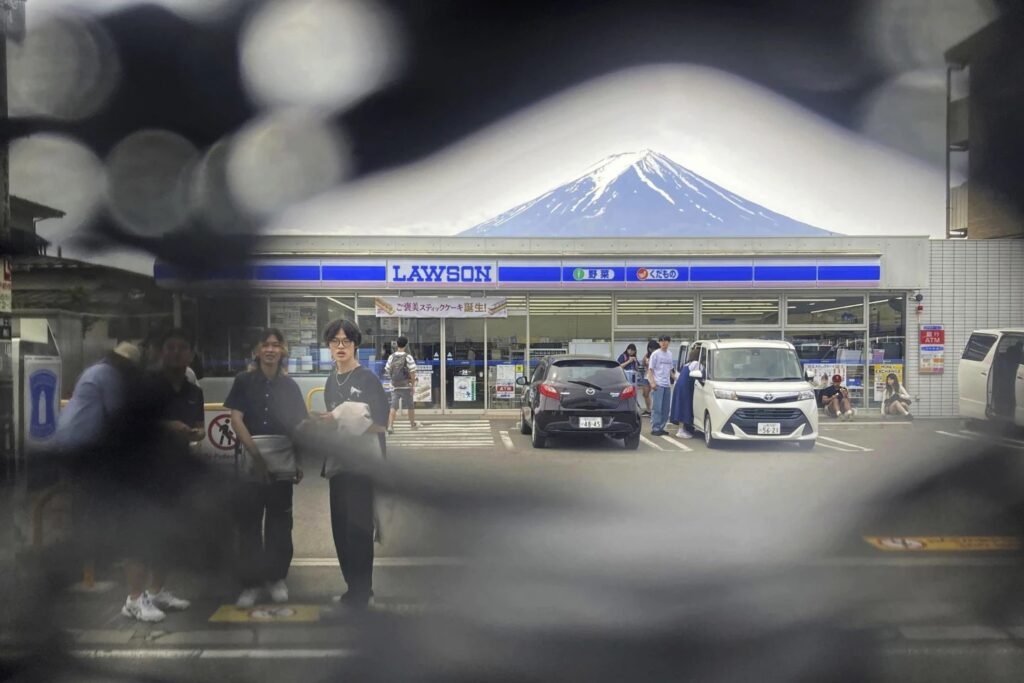
Mt. Fuji is seen through a hole on a black screen installed across from a convenience store in Fujikawaguchiko town, Yamanashi prefecture, central Japan on May 24, 2024. The town that erected the huge black screen last week in an attempt to stop tourists from snapping photos of Mount Fuji and overcrowding the area has discovered holes in the screen and is working to repair them, officials said Tuesday. (Kyodo News via AP)
TOKYO, Japan — The number of foreign visitors to Japan soared 28.5 percent in April year-on-year to a record 3.91 million, official figures showed Wednesday.
“Spring cherry blossom season boosted demand for visits to Japan in many markets, as in the previous month, and overseas travel demand increased in some Asian countries, in Europe, the US and Australia to coincide with the Easter holidays,” the Japan National Tourism Organization said.
It said the total surpassed the previous record of 3.78 million in January 2025 and was the highest single month on record, and the first single month to exceed 3.9 million visitors.
For the first four months of the year the total was 14.4 million, a rise of 24.5 percent.
A weak yen has for months been leading to a boom in visitors, with national tourism figures released in January showing a record of about 36.8 million arrivals last year.
The Japanese government has set an ambitious target of almost doubling tourist numbers to 60 million annually by 2030.
Authorities say they want to spread sightseers more evenly around the country, and to avoid a bottleneck of visitors eager to snap spring cherry blossoms or vivid autumn colors.
READ: Japan revises visa application process for Filipinos
Local pushback
But as in other global tourist magnets like Venice in Italy, there has been growing pushback from residents in destinations such as the ancient capital of Kyoto.
The tradition-steeped city, just a couple of hours from Tokyo on the bullet train, is famed for its kimono-clad geisha performers and increasingly crowded Buddhist temples.
On Mount Fuji, the nation’s highest mountain and a once-peaceful pilgrimage site, authorities have started charging climbers in an effort to reduce overcrowding.
Last year a barrier was briefly erected outside a convenience store to stop people standing in the road to photograph a view of the snow-capped volcano that had gone viral.
Business travelers in cities including Tokyo have complained that they have been priced out of hotels because of high demand from tourists.
Rice shortage
Tourists gobbling sushi and onigiri have also been cited as a factor in shortages of rice, which has pushed the price of the staple to record levels, creating a political headache for the government.
This year the Japanese Meteorological Agency (JMA) on March 30 declared the country’s most common and popular “somei yoshino” variety of cherry tree in full bloom in Tokyo.
Although this year’s blooming dates are around the average, the JMA says climate change and the urban heat-island effect are causing sakura to flower approximately 1.2 days earlier every 10 years.
Katsuhiro Miyamoto, professor emeritus at Kansai University, estimated the economic impact of cherry blossom season in Japan, from travel to parties held under the flowers, at 1.1 trillion yen ($7.3 billion) this year, up from 616 billion yen in 2023.
READ: Record 36.8 million tourists visited Japan in 2024
Your subscription could not be saved. Please try again.
Your subscription has been successful.
Read Next
Disclaimer: The comments uploaded on this site do not necessarily represent or reflect the views of management and owner of Cebudailynews. We reserve the right to exclude comments that we deem to be inconsistent with our editorial standards.


AloJapan.com